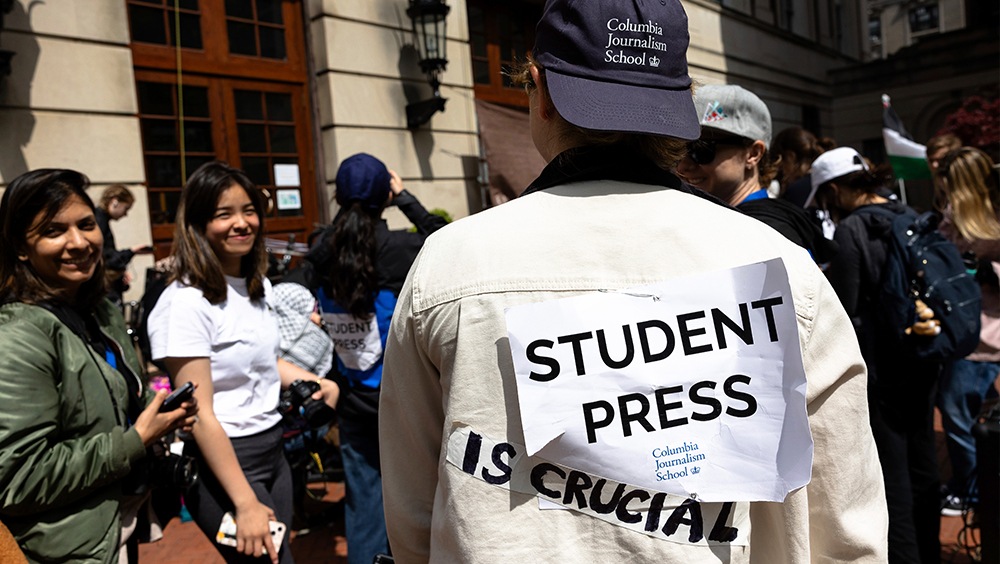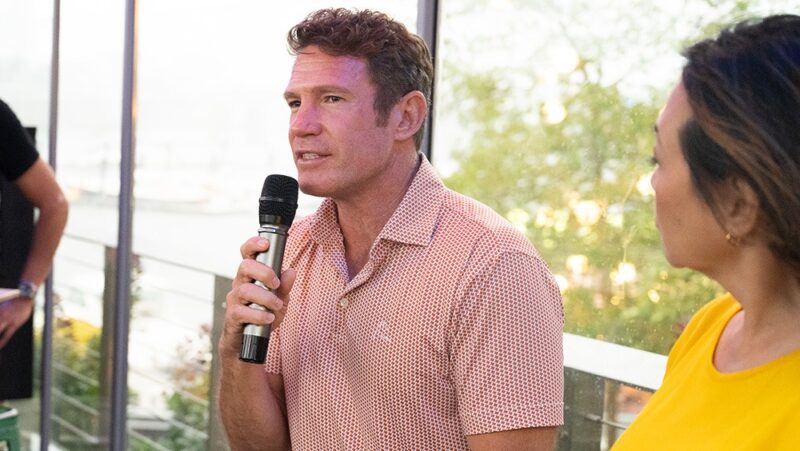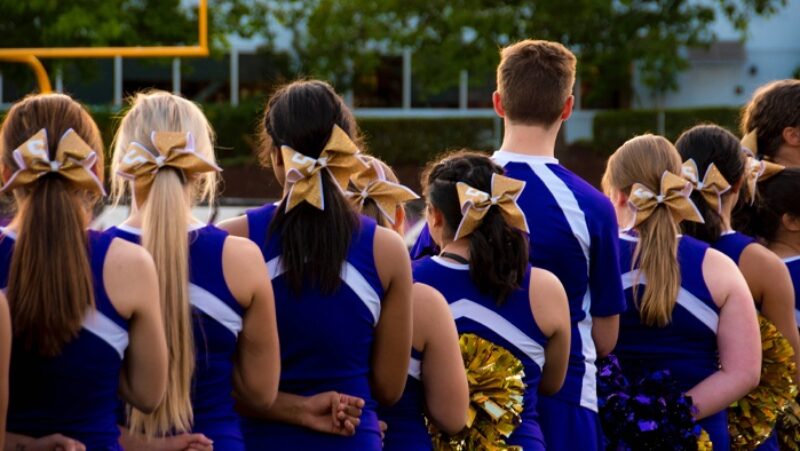Covering Protests as a College Journalist: Know Your Rights

The First Amendment includes several freedoms that students at colleges and universities across the country see firsthand on a daily basis.
The freedom of speech includes not just speaking in class, but expressing yourself through the clothes you wear, the books you read and the signs you make.
The freedom of assembly includes the right to associate with other people in a campus club and to gather peacefully to protest and demonstrate.
Freedom of the press protects both newsgathering (research, interviewing sources, and recording audio and video) and publication (writing, posting and broadcasting). It protects student journalists whether or not they work for student-run media associated with colleges. It may protect them even if they don’t formally work for a publication at all; courts have looked at what a person does, not who they work for, in determining whether someone is a journalist.
College student journalists may encounter some kind of protest, assembly or demonstration during their time as students and members of the free press.
Here is a guide focusing on how college student journalists can cover protests in the context of what the First Amendment does and does not protect, with examples of student coverage of protests in recent decades.
What does the First Amendment say about student press rights?
The 45 words of the First Amendment don’t say anything specific about college students or their press rights. The line that grants press freedom – “or of the press” – is in the context of the entire amendment, which prohibits the government from restricting (i.e. “abridging”) the freedoms of religion, speech, press, assembly and petition.
The First Amendment protects newsgathering and reporting, and it does not distinguish between professional or student journalists nor the kinds of outlets for which they work. Nor has the U.S. Supreme Court ever ruled that college student journalists have any lesser status than full-time professional journalists.
What are student journalist rights when covering protests?
College student journalists have the same rights as other journalists when covering protests. This means that they can freely do their jobs, subject to certain restrictions discussed in detail below:
- Photograph, record, interview, and observe protest participants and any police or security without being stopped or having their equipment confiscated.
- Be in a public space without being required to leave by protesters or threatened with arrest by police.
RELATED: Protesting on college campuses: FAQs answered
Do student journalists’ press rights depend on whether they are at a public or private university?
In short, yes. The First Amendment only applies to government actions, meaning the government – including public universities – is bound by the First Amendment when seeking to curtail the free press rights of student journalists who are covering protests that take place on a public university campus.
Private universities have broad leeway to admit (or deny admission to) anyone onto their campuses or to stop student and professional journalists from recording while on their campus.
But private university control of spaces does not extend to public sidewalks near or running across the campus. Many private universities in cities are adjacent to public streets and sidewalks, which would allow a journalist to stand on a public street and film activities occurring on the private campus even as that journalist cannot enter the private spaces of the campus itself.
Finally, some private universities have internal policies that say they uphold free press and other First Amendment freedoms. These policies differ in scope, scale and enforceability depending on the university and the state. But once a private institution puts a policy in place, it is bound to follow that policy just as it would any other policy found in an official document like a student handbook, faculty handbook or campus code of conduct.
If you’re a college student journalist working for a media outlet sponsored or overseen by a private university, or a non-student journalist covering a protest taking place on a private campus, it is a good idea to:
- Check with university administrators about what, if any, policies they have about free speech and free press issues on campus.
- Contact university safety officials to let them know you intend to cover a protest on campus.
- Know where public spaces end and the private campus begins.
- Clearly identify yourself as a member of the press through clothing and, if available, carry a clearly identifiable name badge that identifies you as a member of the press and the outlet for which you’re working.
Does it depend on the type of publication for which the student journalist is reporting, such as student media or professional media?
In general, no. There is no difference based on what kind of outlet a student is reporting for (e.g. campus media, professional media, as a freelancer, etc.). Freedom of the press does not depend on the type of outlet nor whether someone is employed full time or as a freelancer or stringer.
However, student journalists should be aware that some university-sponsored publications and media outlets have more control over what is published than those that are editorially and financially independent.
There are no U.S. Supreme Court cases that directly involve how and when college administrators may control, direct or censor student-run publications at public universities.
A Freedom Forum guide to college campuses and free speech says this:
A 1969 decision (Tinker v. Des Moines Independent Community School District) established a general principle that student journalists – and other schoolhouse speakers, including faculty – have full First Amendment protection, except when their actions substantially disrupt the educational process or intrude on the rights of others. The Supreme Court has also said (Hazelwood School District v. Kuhlmeier) that school-sponsored publications are subject to greater control whenever educators identify a legitimate educational reason for doing so.
Both these cases referred to high school publications. Courts are split on their application to college publications. In 2001, an appeals court ruled that a university yearbook could not be censored, saying college publications should not automatically be considered in the same way as those in high schools.
If you’re a student journalist covering a campus protest as a freelancer for a non-campus media outlet, and an official identification is not available, it is advisable to carry with you a letter or instruction from the media outlet editor/publisher that includes your name and assignment and their contact information. This could help if any protest organizers or campus/law enforcement officials question your presence.
What are limits on student press rights when covering protests?
Regardless of your status as a student journalist and who you’re reporting for, freedom of the press is not absolute. Just as there are legal limits to the freedom of speech (such as defamation and inciting imminent lawless action), journalists don’t have a right to be anywhere at any time and do anything they want, even if covering a protest on a public university campus.
Some exceptions to freedom of the press for student journalists (and all journalists) covering campus protests include:
- Trespassing or entering off-limit buildings or secure areas that are locked or deemed closed. This includes buildings that have been breached by protesters.
- Interfering with the arrest of a protester or otherwise blocking a police officer from doing their job.
- Ignoring a lawful order from police to disperse or being in an area designated as off limits due to a public safety threat, such as if police declare a riot.
- Recording people in places where there is a reasonable expectation of privacy, including inside dorm rooms, in gym locker rooms or in restrooms.
Recording audio — including phone calls, your interviews and overheard conversations — without consent may violate the law, depending on the state you’re in. Check applicable laws on recording conversations for each state here.
The key to recording in public spaces comes down to the "reasonable expectation of privacy." Is the subject of your recording in a place where they would expect anything they do or say would be seen or heard by others – like an open outdoor space on campus – or are they in a place where they would expect to remain private, like their dorm room or a bathroom? Importantly, the reasonable expectation of privacy is always a matter of context.
Note that some of these exceptions to press freedom involve discretion from police. Whether you are “interfering” with an arrest or merely observing and recording it from a few feet away is not neatly spelled out in state or federal law. This means it’s possible you could be instructed to stand back or risk being arrested yourself even if you feel you are not interfering with police. Courts have also deferred to law enforcement when considering whether a journalist may have created a security risk or interfered with the ability of officers to do their jobs.
This is why having a video recording of what is going on around you and exercising your right to record police and protesters in public may help if you find yourself being detained or arrested while covering protests.
RELATED:
- Recording police: First Amendment right or arrestable offense?
- Is it illegal to record in public without permission?
If the protest is in an area with strong cell service and you have a good data plan, or you have a wireless hotspot, it is advisable to livestream your video (such as on YouTube, Facebook Live, Twitch, or other sites) in case your phone is confiscated or low on storage space. The American Civil Liberties Union has an app that helps people record interactions with police, including at protests, and send the video directly to them in case the phone is taken or damaged.
But know that police cannot take your camera, phone or other devices unless you are being arrested, other than to briefly inspect those devices to make sure they do not present safety concerns. Even when you have been arrested – and certainly when you have not – police cannot damage devices or search the contents of a phone, camera or other device unless they have a search warrant allowing them to do so.
Journalists with an intent to disseminate information to the public are further protected from search and seizure of devices by the federal Privacy Protection Act, which requires both a search warrant and probable cause that the contents of the device:
- Are relevant to a crime the journalist committed.
- Present a risk to national security or are necessary to protect the life or safety of another person.
- Have been subpoenaed but not produced.
- Are likely to be destroyed immediately.
Police can never delete photos or videos from your devices or make you delete them.
Examples of student reporting on protests
In 2023 and 2024, protests at college campuses made national headlines over university responses to encampments stemming from the Israel-Hamas war. But college students have been protesting – and covering protests at their own universities – for much longer.
Here are several examples of how college student journalists have covered campus protests historically and more recently:
- Columbia University, 1968 and 2024
- Kent State University, 1970
- University of Missouri, 2015
- Multiple universities, 2024, catalogued by The Hechinger Report and the Associated Press
Additional resources for student journalists covering protests
Freedom Forum is a nonprofit, nonpartisan organization that helps educate people about First Amendment freedoms, including press freedom. However, it is not a legal clinic or law firm, nor does it engage in legal advocacy or represent people in court.
Some additional outside resources available for student journalists include:
- Student Press Law Center: Covering protests guide and legal hotline for student journalists.
- Reporters Committee for Freedom of the Press: Guide to protesters, police and the press and legal hotline.
- Society of Professional Journalists: Resources for journalists covering protests and legal defense fund.
Scott A. Leadingham is a Freedom Forum staff writer. Email
Athletes, Activism and the First Amendment: A Conversation With Nate Boyer
Perspective: Students, Parents and Free Speech Win in Cheerleading Case
Related Content

